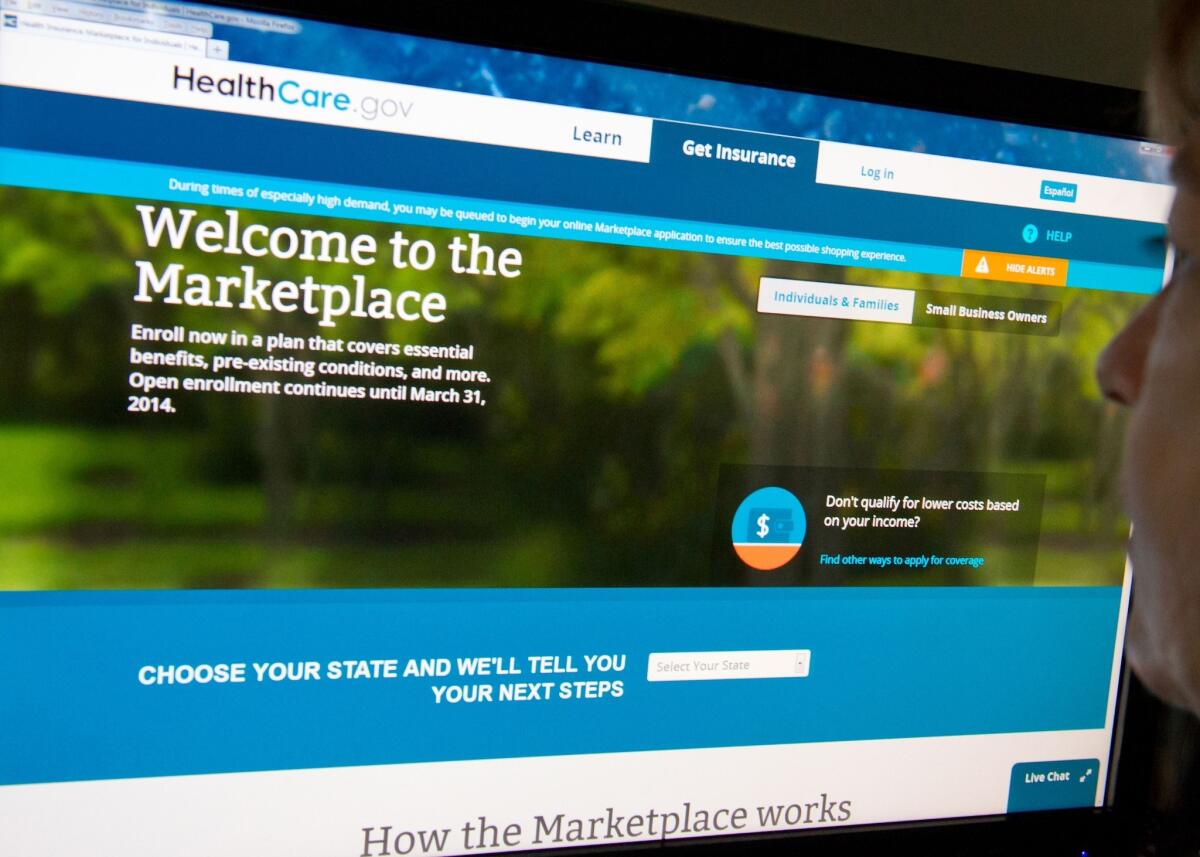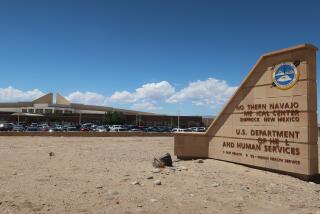Grim scenario for Hawaii’s Obamacare plan: The numbers don’t add up

As the Hawaii Legislature weighs bills that would make sweeping changes to the state’s Obamacare program, the interim director of Hawaii’s healthcare exchange on Wednesday laid out a grim financial picture facing the agency.
With anemic enrollment by individuals and little interest among small-business employers, the state’s nonprofit exchange -- known as the Hawaii Health Connector -- is unlikely to have enough money to pay its bills, even under the best of circumstances, when federal grant money dries up in 2015.
The exchange had originally planned to stay afloat by collecting a 2% fee on every plan sold through the exchange, but with the slow pace of enrollment and changing federal rules -- delaying the employer mandate and allowing canceled plans to continue -- Interim Director Tom Matsuda said Wednesday that the math simply does not add up.
Last week, Matsuda and the Health Connector’s board members used expected enrollments by 2016, as well as the average premium costs, to calculate how much the exchange could collect by exacting its 2% fee on each plan.
“That revenue figure is far below what we think our expenses are going to be,” said Matsuda, who has estimated that the agency will need about $15 million a year starting in 2015. Health Connector board members also looked at the best-case scenario for enrollment, and “even then, we’re still short on having enough revenue to cover projected expenses,” he said.
When the Affordable Care Act passed, Hawaii appeared to be one of the states best-positioned to benefit. Because of a 40-year-old state law requiring employers to provide coverage, its uninsured population is among the lowest in the nation at 100,000 people, or 8%. But even with $205 million in federal grants, the state’s exchange has been mired in technical problems that have kept enrollment the lowest among the 50 states -- just 4,300 as of mid-February. Beyond those problems, Matsuda said that low demand for health insurance in Hawaii would make it difficult for the exchange to stay afloat over the long term.
Of the 100,000 uninsured in Hawaii, about half are expected to be eligible for Medicaid -- meaning just 50,000 people would buy individual plans through the Health Connector under the best-case scenario. And while Hawaii hoped to sell thousands of plans through the exchange’s small-business marketplace, Matsuda said so few small businesses are eligible for tax credits that officials are simply not seeing the demand. “What people can get on the Connector versus outside the Connector is the same, so there isn’t really a strong incentive for small employers to use the Connector,” he said.
Further complicating matters, only two insurers offer plans on Hawaii’s exchange, so many companies are continuing to rely on their longtime brokers (who, having essentially been cut out of the process, have no incentive to help Hawaiians buy plans on the exchange).
“This is not a problem of the operations,” Matsuda told lawmakers, who have been demanding more information about how the nonprofit has operated. “It’s a problem with the market not fitting exactly what the [Affordable Care Act] mandate is all about.”
Health Connector officials are pleading with officials at the federal government’s Centers for Medicare and Medicaid for a waiver that would give them more time to spend the $205 million in federal grant funds that must be used or allocated by the end of the year.
That flexibility, Matsuda says, would allow the Health Connector to try to fix some of the technical problems that have stifled enrollments. One major source of the problems is a communication breakdown between the two systems that a consumer must navigate to get signed up for a health insurance plan. Every Hawaiian must get a denial of Medicaid eligibility through the state system -- built by one contractor -- before they can apply for tax credits to help buy a plan through the Health Connector’s system -- built by a second contractor.
Nearly 20,000 applications have been caught between the two systems.
If federal officials agreed to give the Health Connector more time to spend the grant money, Matsuda said, the agency could work on streamlining and integrating those two systems, among other things.
“We’re just going to assume right now that that’s not going to happen,” Matsuda said of the waiver, “but we’re just going to keep pushing to see if we can get a decision.”
As Hawaii healthcare officials try to find a solution for its financial problems, lawmakers are revising a series of bills intended to improve accountability for the Health Connector, which as a private nonprofit does not directly report to legislators.
House Bill 2529, a measure introduced by Health Committee Chairwoman Della Au Belatti and 19 of her colleagues, would have dissolved the nonprofit and brought the healthcare plan under the control of the state. At a legislative hearing in early February, Belatti proposed placing the Health Connector temporarily under control of the governor’s office beginning in 2015.
But lawmakers on the House Commerce and Consumer Protection Committee backed off that change because of concerns that the state would then absorb the exchange’s financial and legal liability problems. Instead they drafted changes that would give a legislative committee the right to monitor the Health Connector’s finances and operations, and would require that the agency submit a detailed budget and sustainability plan to lawmakers each fiscal year.
Legislators are also considering adding a “sustainability fee” to every health insurance plan sold in the state, with the money going to pay for the Health Connector’s operations.
“Maybe in the long run, the market just never will be big enough to sustain this,” Democratic State Rep. Angus L.K. McKelvey said at the end of a two-hour hearing Wednesday. “We need to get these numbers; we need this information. We need to talk about IT and all these other things so we can address them now and have good understanding to work with you and others to create the most responsible, transparent and accountable system.”
maeve.reston@latimes.com
Twitter: @MaeveReston
More to Read
Sign up for Essential California
The most important California stories and recommendations in your inbox every morning.
You may occasionally receive promotional content from the Los Angeles Times.










